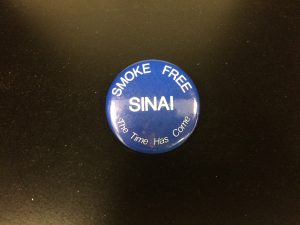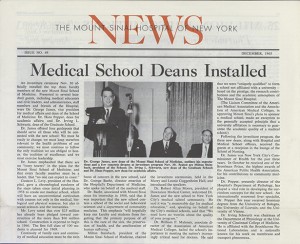Jan 16, 2018
This year marks the 50th anniversary of the opening of the Icahn School of Medicine at Mount Sinai. Classes began on September 9th, and on October 20, 1968 there was a day-long celebration to dedicate the School and inaugurate Dean George James, MD as the first President of The Mount Sinai Medical Center. As part of this special day, there was a colloquium in the morning with four Nobel Prize laureates speaking about the future of medicine. (The papers presented by the speakers were later published in the Mount Sinai Journal of Medicine. They are available here.) In the afternoon there was the dedication of the School and the inauguration of Dr. James. In the evening there was a banquet held at the Grand Ballroom at the Hotel Commodore.

Cigar order for the Dedication Day banquet
The Aufses Archives has several files about the planning and creation of this big event and how it all came together over a few short months. No detail was too small for the organizers to organize, as evidenced by an invoice for 1,000 cigars to be sent to the hotel from the 21 Club (founded by the brother of Mount Sinai Trustee I. Robert Kriendler). Today we would be shocked if a hospital passed out tobacco products but the 1960s were a different time. Still, already the tide was turning. In March of 1968, the Trustees’ Executive Committee had voted 8 to 5 to ban the sale of cigarettes at Mount Sinai, but it was not until 1989 that areas of the Hospital started to be designated as smoke free. This was the result of action by the Student Council of the School, with the support of the Dean’s Office, and then working with the Hospital administration and the Medical Board. What was seen by some at the time as difficult to implement is now viewed as a simple idea whose ‘time had come.’

A button created by Mount Sinai students to encourage the institution to go smoke free, 1989
Nov 4, 2015
Fifty years ago, on November 30, 1965, the first Deans of the new Mount Sinai School of Medicine were installed. These men were: George James, MD, MPH, Dean of the School of Medicine, as well as the founding chairman of the Department of Community Medicine (today’s Preventive Medicine department); Irving Schwartz, MD, Dean of the Graduate School of Biological Sciences and Chairman of the Department of Physiology; and Hans Popper, MD, PhD, Dean for Academic Affairs, Chairman of Pathology, and a pioneer hepatologist. At the investiture ceremony held to mark the occasion, many statements and promises were made about the future of the new school. With hindsi ght, we can see that many of these not only came true, but remain relevant today.
ght, we can see that many of these not only came true, but remain relevant today.
Gustave L. Levy, Chairman of the Board of Trustees at Mount Sinai, noted that it was important that the school would have courses not only in the biomedical sciences, but also in the social sciences and humanities. This emphasis on the value of the humanities has had an up and down history at Mount Sinai, but it was revived again in 1987 with the creation of the Humanities in Medicine program and today’s expanded FlexMed admission program, as well as the 2012 creation of the Academy for Medicine & the Humanities. George Baehr, MD also spoke at the event about the value of the social sciences. He graduated from Mount Sinai’s house staff in 1908 and led the First Medical Service at Mount Sinai for many years. Baehr led Mount Sinai’s World War I unit and later created HIP for his friend and patient, Mayor LaGuardia. Dr. Baehr said in his remarks that it was important that medical students be exposed to the humanities and community medicine, because it will “hopefully keep our faculty and students from forgetting that the primary purpose of all this is the care of the sick, the preservation of health, and the amelioration of human suffering.”
Finally, Dr. James outlined standards that have guided Mount Sinai over the last 50 years. He said Mount Sinai has “four separate responsibilities”: “We must constantly be humble, we must constantly welcome criticism, be critical of ourselves, and be ready to change. The second responsibility we have is that of relevance… We must always remain part of the community. We must always be alert to the solution of the problems which are current in the community, and in the world… It is essential that this institution remain relevant to the health problems of our era, no matter what they be – and they will change – and no matter what problems are brought to us in the years to come. The third responsibility we have… is the responsibility for excellence. We are not privileged to follow in the footsteps of those who went before if we will not accept this challenge for excellence. There must be no compromise with it, no compromise under any circumstances. One final responsibility that we must assume… is the responsibility of leadership. … The institution has prided itself by being always among the forefront of medical care and research institutions, and those of us associated with it must be prepared to at least try to carry it to new heights.“
For more on the Archives or the history of Mount Sinai, contact us at msarchives@mssm.edu



